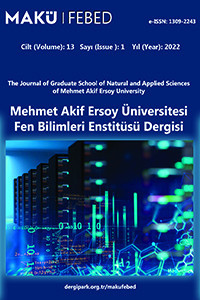Ultrasonik Algıyıcılar Yardımıyla Pantolon Bedeni Belirleyen Cihaz Tasarımı
Ultrasonik algılayıcı, kontrol devresi, yazılım, ölçüm, pantolon
Equipment Design with Ultrasonic Sensors That Determines the Trousers Size
Ultrasonic sensor, control circuit, software, measurement, trouser,
___
- Rifkin, J. (2012). The Third İndustrial Revolution: How the İnternet, Green Electricity, and 3-D Printing are Ushering in a Sustainable Era Of Distributed Capitalism, World Financial Review, 1.
- Kodaman, L. ve Sarı, S. (2014). Disiplinler Ararası Bağlamda Tuval Resimlerinin, Dijital Baskı Yöntemi Kullanılarak Giyilebilir Sanatta Uygulanmasına Yönelik Bir Çalışma. Cumhuriyet International Journal of Education 2.4.
- Türksoy, E. S., Üstüntağ, S., Sarıtaş, Ö., Saraçoğlu, Ö. G. (2015). Tekstil Malzemelerinin Elekt-romanyetik Kalkanlama Etkinliği Ölçümünde Yenilikçi Bir Test Aparatı. Journal Of Textiles And Engi-neer, 3. 2015.
- Yılmaz, N., Sağıroğlu, Ş., Yaldız, E., Bayrak, M., Mobil Robotlar İçin Pid Pozisyon Kontrollü Ult-rasonik Mesafe Ölçüm Sisteminin Tasarımı ve Gerçekleştirilmesi.
- Aydoğan, T., Kağan, G., Emrah, D. (2009). Ultrasonik Sensör İle İki Boyutlu Haritalandırma Sis-temi. SDU International Journal of Technological Science 1.1.
- Ratner D., McKerrow P. (2003). Navigating an outdoor robot along continuous landmarks with ultrasonic sensing, Elsevier Robotics & Auton. Systems, 45, pp.73–82.
- Sekmen A.S., Barshan B. (2001). Estimation of object location and radius of curvature using ultrasonic sonar, Elsevier Applied Acuoustics, 62, pp.841-865.
- Mihajlik P., Guttermuth M., Seres K., Tatai P. (2001). DSP-Based Ultrasonic Navigation Aid for the Blind, IEEE Inst.& Measu.Tech. Conference, Budapest, Hungary, pp.1535-1540.
- Webster D. (1994). A Pulsed Ultrasonic Distance Measurement System Based Upon Phase Di-gitizing, IEEE Trans. on Instru. & Meas. V.43, N.4, pp.578-582.
- Nonaka H., Da-te T. (1994). Ultrasonic Position Measurement and its Applications to Human In-terface, IEEE IMTC’94, Hamamatsu.
- Murugavel, R. (2001). Ultrasonic Distance Measurement With the MSP430, Texas Instruments Application Report.
- Alonso, L., Milanes, V., Torre-Ferrero, C., Godoy, J., Oria, J.P., De Pedro, T. (2011). Ultrasonic Sensors in Urban Traffic Driving-Aid Systems, Sensors, 11(1), 661-673.
- HC-SR04 Datasheet, Revulation Education Ltd, Bath,UK
- Yayın Aralığı: Yılda 2 Sayı
- Başlangıç: 2010
- Yayıncı: Burdur Mehmet Akif Ersoy Üniversitesi
Mustafa ARI, Gürkan BİLGİN, Osman ÖZCAN
Sığ Sualtı Yapıların Belirlenmesinde Yer Radarı (GPR) Uygulaması: Beyşehir Gölü Örneği
Hasan Hüseyin AKSU, Muhittin GÖRMÜŞ, Mehmet Zakir KANBUR
RFID Kart Sistemi İle Personel Odası, Sınıf ve Laboratuvar Giriş Kontrolü
Özdemir DENİZ, Osman CEYLAN, Arzu ULUSOY
Zararlı Yazılım Yayma Aracı Olarak Mobil Uygulamaların Kullanılması: Pokemon Go Örneği
Mehmet YALÇINKAYA, Besim ALTINOK, Mehmet GÜRDAL, Meryem AKDOĞAN, Ecir KÜÇÜKSİLLE
Türkiye’de İş Makineleri Operatörlüğü Programının Önemi ve Geleceği
Mustafa PEHLİVAN, Batuhan ÖZAKIN, Abdülvahap ÇAKMAK
Sınav Salonu İlanı ve Duyuru Görüntüleme Sistemi Otomasyonu
Taşıt Egzoz Emisyonlarını Azaltma Yöntemlerindeki Gelişmeler
Ahmet UYUMAZ, Fahrettin BOZ, Emre YILMAZ, Hamit SOLMAZ, Seyfi POLAT
Kafa Hareketleri İle Kontrol Edilebilen Tekerlekli Sandalye
Ahmet Ali SÜZEN, Özdemir DENİZ, Abdil ÇETİN
Isparta’nın Coğrafi Bilgi Sistemleri (CBS) Tabanlı Bağıl Nem Dağılışı
